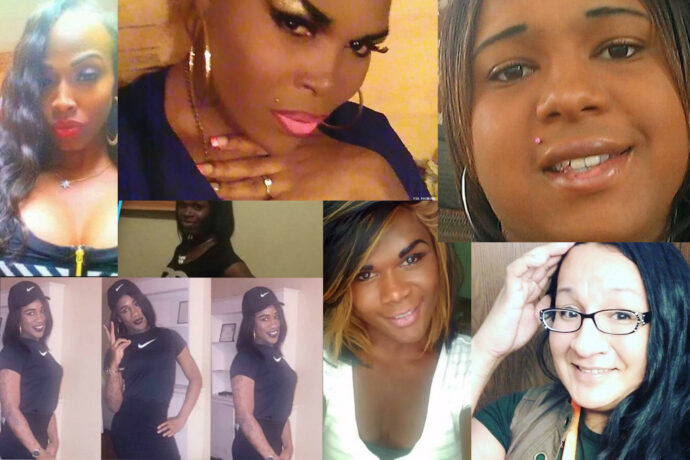Just nine weeks into this year, at least seven trans people—all women of color, and most of them black trans women—have been murdered in the U.S.
These are their names:
Mesha Caldwell. JoJo Striker. Jamie Lee Wounded Arrow. KeKe Collier. Jaquarius Holland. Chyna Gibson. Ciara McEleveen.
These names represent only the deaths that have been reported, only the women whose communities spoke out to correct the record and demand respect for their loved ones after police and media misgendered them.
This number does not account for the ongoing violence that is perpetuated against trans women of color. Likewise, this list of names does not recognize the countless acts of violence that occur every day, worldwide, against those who dare to exist outside of gender binaries.
For trans persons of color, under-reported violence is a fact of life. The systems that exist to “protect and serve” either cannot or will not respond, forcing this underserved community to know all too well why, by some estimates, the average life expectancy for trans woman in the Western hemisphere is just 35 years.
How do we live with this reality? What ought we do in this moment where daring to exist results in relentless violence that often ends in murder?
When I say “we,” I mean both the larger cultural community and those of us who call ourselves people of faith. As a lifelong baptist and public theologian, whose queer and Latinx identities compel me to challenge hegemonic Christianity, I am called, along with the People of Color (POC) collective at Faith Matters Network, to critically examine the practices that prescribe such violent intolerance to difference.
If, as Rev. Alexia Salvatierra told me last week, we are made for creative impact, then trans women of color are, in fact, the living proof of our shared human purpose. Trans women inherently possess the creative capacity to imagine themselves differently and become women.
But instead of revering this relentless authenticity in the face of such hostility, our society, and too many of our faith communities, shun these individuals, who are answering their own divine call to live their purpose. It is time we throw open the doors of our hallowed, sacred spaces, and humbly ask those we have rejected for forgiveness, promising to stand beside them, provide sanctuary, and tirelessly defend their right to exist.
But even this offer of safety and protection is not enough, because so much of our moral horizon is rooted in theologies that perpetuate the same violence we claim to oppose. If we cannot recognize that ideas about safety and protection are owned by the ruling class of white folks, we cannot disrupt the dominant narrative that creates those deadly theologies of indifference.
Challenging these ruling theologies, what I call supremacist theologies, requires the creation of a counter-theology—one of resistance to indifference. To support such a politics and to actively resist indifference, this counter-theology must be rooted in the act of bridging. As Gloria E. Anzaldúa writes, “To bridge is to attempt community, and for that we must risk being open to personal, political, and spiritual intimacy, to risk being wounded.”
By opening ourselves to such intimate injury, and exploring our own differences, we can begin to close the gap between ourselves and others who also enflesh deep differences.
Adopting this counter-theology of deep resistance to indifference allows us to imagine a new moral horizon. It allows us—more, it commands us—to fight like hell for the living, and honor those whose lives have been taken by the violence fed by our own religious rhetoric.
Such a theology asks us to first focus our attention on the center of our own difference, then build bridges from that reality to the center of an other’s difference. In so doing, we become connected with the deep, abiding difference of someone else, finding contours of unity in what we previously saw as fundamental distinctions between ourselves and an “other.”
Adopting social practices that embrace the real humanity of those who are different not only helps us to be human with one another (a particular failure of our current social and political reality), but also supports a relational theology and ethics that can destigmatize those who have been pushed to the margins.
This relational theology can then help us all to embrace those who enflesh the politics of radical difference. A natural result of that embrace, from our deepest postures of welcome, is an honest invitation to full participation in our own community’s entanglement of radical difference. This enthusiastic entanglement, in turn, becomes a shield against the violence that so precisely targets those deemed “different.”
By welcoming these women—and all those our own theologies have threatened—we can begin to honor those whose lives have been taken by violence.





